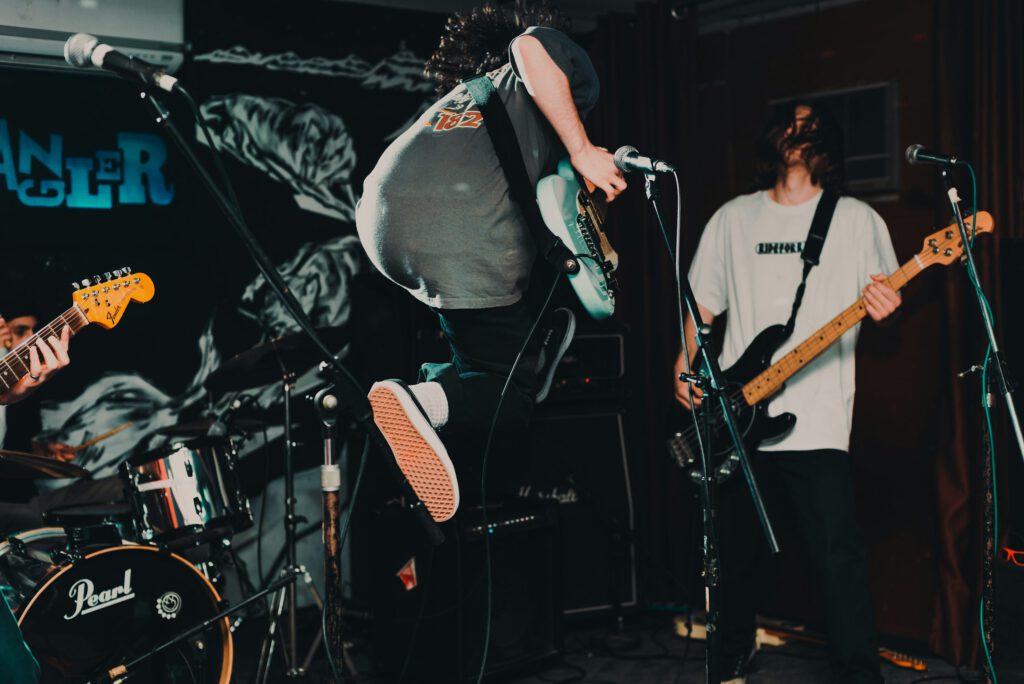Introduction
Punk music has always been about energy, rebellion, and raw expression. While the spotlight often falls on singers or the chaotic atmosphere of live shows, the guitarists are the ones who carve the backbone of the sound. From three-chord assaults to inventive riffs that reshaped rock itself, punk guitarists have defined generations of music. Here are ten of the most influential and best punk guitarists of all time.
1. Johnny Ramone (Ramones)
Johnny Ramone is the archetype of punk guitar. Using downstrokes almost exclusively, he created a relentless, machine-like rhythm that drove the Ramones’ songs forward. His stripped-down, power-chord style proved that simplicity could be powerful. Without solos or flourishes, Johnny influenced nearly every punk guitarist who followed, proving that speed, precision, and attitude could redefine rock guitar.
2. Steve Jones (Sex Pistols)
Steve Jones brought a heavier rock sensibility into punk. His playing was raw, muscular, and full of swagger. Songs like “Anarchy in the UK” and “Pretty Vacant” featured thick, layered riffs that gave the Sex Pistols’ sound its punch. Unlike Johnny Ramone’s stark minimalism, Jones embraced a harder, dirtier style that bridged punk and hard rock. His impact on British punk and beyond is immeasurable.
3. Joe Strummer (The Clash)
Joe Strummer’s guitar work was less about technical flash and more about rhythm and feel. His playing helped make The Clash one of the most versatile punk bands, seamlessly blending reggae, rockabilly, and funk. Strummer embodied punk’s ethos: simple, direct, and socially charged. His rhythm guitar powered songs like “London Calling” and “Clampdown,” setting the tone for a band that pushed punk’s boundaries.
4. Mick Jones (The Clash)
If Strummer was the heart of The Clash’s rhythm, Mick Jones was the color and texture. Jones added melodic leads, inventive riffs, and a tunefulness that distinguished The Clash from their peers. His contributions to songs like “Complete Control” and “Train in Vain” showed that punk guitar could be both fierce and melodic. Together with Strummer, he formed one of the most iconic guitar duos in rock history.
5. Greg Ginn (Black Flag)
Greg Ginn defined American hardcore guitar playing. His style was abrasive, fast, and chaotic, often laced with dissonant notes and improvisational bursts. On albums like Damaged, Ginn pushed the boundaries of punk guitar into experimental and almost free-jazz territory while keeping the aggression intact. His willingness to break rules inspired countless hardcore and alternative guitarists.
6. East Bay Ray (Dead Kennedys)
East Bay Ray brought a surf-rock influence into punk, giving Dead Kennedys their unique, twisted sound. His reverb-soaked riffs and unconventional chord progressions made songs like “Holiday in Cambodia” stand out from the punk crowd. Ray proved that punk guitar could be strange, angular, and theatrical without losing intensity. His creativity influenced bands far outside punk’s immediate circles.
7. Bob Mould (Hüsker Dü)
Bob Mould fused punk aggression with melodic sensibilities, laying the groundwork for alternative rock and grunge. His buzzing, distorted guitar lines and layered soundscapes gave Hüsker Dü a sonic depth rare in hardcore punk. Tracks like “Chartered Trips” and “New Day Rising” showed how punk guitar could be both emotional and ferocious. Mould’s work continues to inspire bands that balance melody with volume.
8. D. Boon (Minutemen)
D. Boon’s guitar style was unlike anyone else in punk. Angular, funky, and unpredictable, his playing defied punk clichés while still embodying its do-it-yourself spirit. In Minutemen, Boon’s sharp, staccato riffs meshed with jazz and funk rhythms, creating a sound that was distinctly punk yet forward-thinking. His tragic early death cut short a career that hinted at even greater innovations.
9. Billie Joe Armstrong (Green Day)
Billie Joe Armstrong brought punk guitar into mainstream consciousness in the 1990s. His crisp, tight power-chord playing on Dookie and beyond introduced millions to punk’s energy. Armstrong’s ability to craft catchy, driving riffs showed how punk guitar could evolve while staying accessible. Though often dismissed by purists, his influence on modern punk and pop-punk guitarists is undeniable.
10. Tom Verlaine (Television)
While Television is often filed under post-punk or art-punk, Tom Verlaine’s contribution to punk guitar cannot be ignored. His intricate, melodic playing on Marquee Moon redefined what punk could sound like. Verlaine stretched beyond the genre’s limitations, proving that punk guitar could be intellectual and complex without losing edge. His interplay of melody and experimentation inspired generations of musicians seeking more from punk’s raw canvas.
Conclusion
Punk guitar is not about technical virtuosity. It is about impact, attitude, and pushing against limits. From Johnny Ramone’s downstrokes to Tom Verlaine’s artful leads, these guitarists each redefined what punk could be. They influenced not only punk bands but also the broader landscape of rock music. Punk guitar endures because of this balance between simplicity and innovation, rage and creativity. These ten players embody why punk’s voice remains vital.




